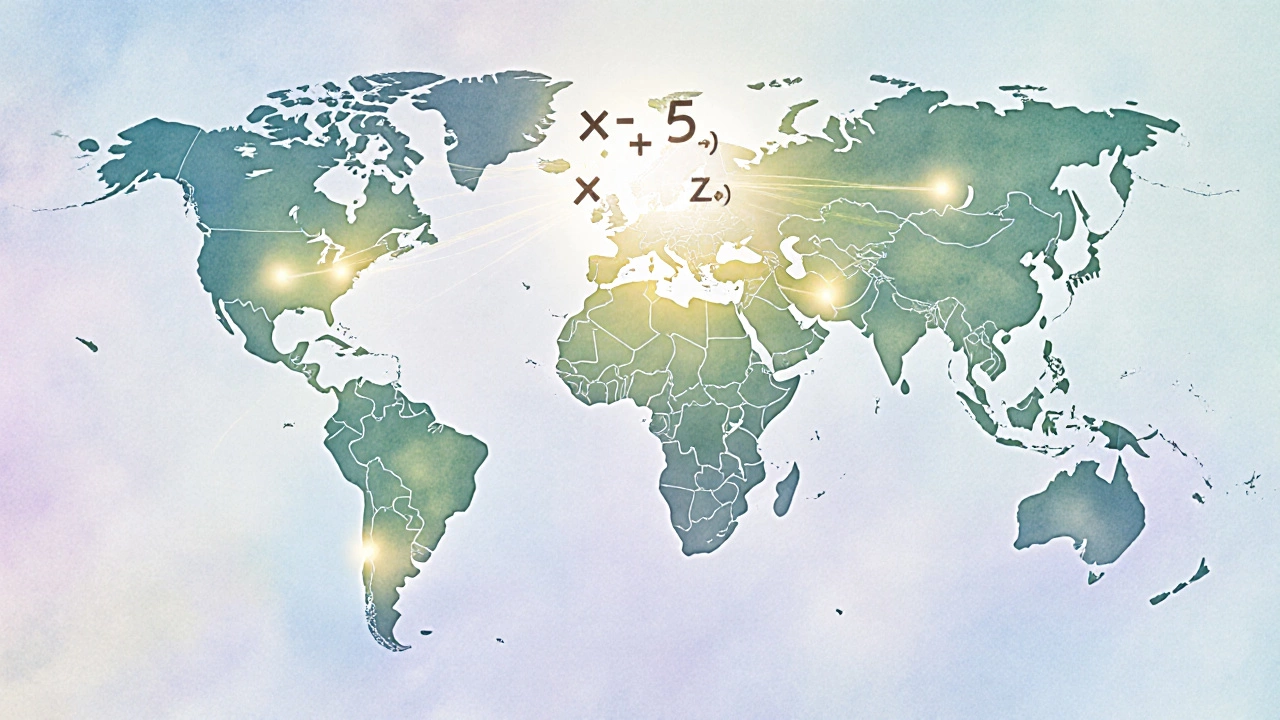Math Rankings 2025 Explorer
| Rank | Country / Region | PISA Score | TIMSS Score (Grade 8) | Key Strength |
|---|
Singapore
PISA Score: 595
TIMSS Score (Grade 8): 620
Key Strength: Consistent teacher development
When it comes to global math performance, most people picture a single nation that repeatedly steals the spotlight. In 2025 that spotlight shines on Singapore - a small island city‑state that has topped every major international mathematics assessment for the past decade.
Why Singapore Keeps Winning
Singapore’s success isn’t a fluke. The country combines three core ingredients:
- Focused curriculum - math concepts are introduced early and revisited with increasing depth.
- Rigorous teacher training - educators undergo a five‑year university program followed by a two‑year practicum.
- Cultural emphasis on mastery - families and schools share the belief that effort, not innate talent, drives results.
These pillars line up with the findings of the Programme for International Student Assessment (PISA) and the Trends in International Mathematics and Science Study (TIMSS). Both surveys rank Singapore above 80 other economies on the mathematics scale.
How International Math Scores Are Measured
Understanding the rankings means knowing what the numbers represent. Two organizations dominate the field:
- PISA - conducted every three years by the Organisation for Economic Co‑operation and Development (OECD). It tests 15‑year‑olds on real‑world problem solving.
- TIMSS - a quadrennial study led by the International Association for the Evaluation of Educational Achievement (IEA). It focuses on 8‑ and 12‑year‑old students.
Both assessments generate a scale where 500 points represent the international average. Scores above 600 signal elite performance.

Latest 2025 Math Scores - The Top 5
| Rank | Country / Region | PISA Score | TIMSS Score (Grade 8) | Key Strength |
|---|---|---|---|---|
| 1 | Singapore | 595 | 620 | Consistent teacher development |
| 2 | Hong Kong | 585 | 610 | Early exposure to problem‑solving |
| 3 | Shanghai (China) | 580 | 605 | Data‑driven instruction |
| 4 | Finland | 560 | 580 | Student‑centered learning |
| 5 | Japan | 555 | 570 | Integrated STEM curriculum |
Notice that Singapore leads by a comfortable margin in both PISA and TIMSS, confirming its position as the #1 country in math for 2025.
Factors Behind the Leaders’ Success
While each top performer has a unique story, four common threads emerge:
- Curriculum coherence - content builds logically year after year.
- Professional learning communities - teachers regularly share data and refine lessons.
- Assessment culture - low‑stakes quizzes inform instruction, while high‑stakes exams motivate mastery.
- Parental involvement - families value math literacy and provide supplemental resources.
For instance, Finland’s education system invests heavily in teacher training. All teachers must hold a master’s degree, and they spend a full year in school‑based mentorship. Hong Kong, on the other hand, emphasizes early mathematics education through after‑school math clubs that nurture problem‑solving habits.

Can Other Countries Catch Up?
Countries that lag behind often share three gaps:
- Fragmented curricula that jump between topics.
- Limited professional development for teachers.
- Low societal expectations about math ability.
South Korea, despite strong overall performance, has slipped to 9th place in the latest PISA cycle because its curriculum became too test‑driven, leaving little room for creative reasoning.
Policy makers looking to improve math scores can adopt a proven roadmap:
- Standardize the math progression from primary to secondary school.
- Allocate funds for continuous teacher upskilling - e.g., three‑day summer institutes each year.
- Launch nationwide math competitions that celebrate logical thinking over rote memorization.
When these steps are combined with community outreach, the odds of moving up the rankings increase dramatically.
Key Takeaways
- Singapore remains the #1 country in math rankings for 2025, leading both PISA and TIMSS.
- Strong teacher training, coherent curricula, and a mastery‑oriented culture are the common success factors.
- Other high‑performing economies-Hong Kong, Shanghai, Finland, Japan-share similar education ecosystems.
- Countries that want to improve should focus on curriculum coherence, teacher professional development, and societal attitudes toward mathematics.
- International assessments like PISA and TIMSS provide reliable benchmarks for tracking progress over time.
Frequently Asked Questions
Which country topped the 2025 PISA math test?
Singapore achieved the highest average score of 595, placing it at the top of the 2025 PISA mathematics rankings.
How does TIMSS differ from PISA?
TIMSS focuses on 8‑ and 12‑year‑old students and measures curriculum‑based knowledge, while PISA assesses 15‑year‑olds on real‑world problem solving. TIMSS is run by the IEA; PISA is an OECD initiative.
Why does teacher training matter for math performance?
Well‑trained teachers can translate complex concepts into age‑appropriate lessons, diagnose student misconceptions early, and employ research‑backed instructional strategies-all of which boost student achievement.
Can developing countries improve their math rankings?
Yes. Targeted reforms-such as adopting a clear math progression, investing in teacher professional development, and fostering a culture that values effort-have helped several middle‑income nations climb the rankings within a decade.
What role does cultural attitude play in math success?
A societal belief that math ability can be developed through hard work (rather than being innate) encourages students to persevere, seek help, and engage with challenging problems, which directly lifts test scores.
